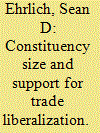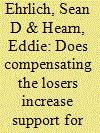| Srl | Item |
| 1 |
ID:
089321


|
|
|
|
|
| Publication |
2009.
|
| Summary/Abstract |
Studies of the political economy of trade frequently rely on the assumption that the larger a policy maker's constituency, the more supportive of free-trade that policy maker will be. Large constituencies are supposed to yield concern for the national interest and provide insulation from particularistic, protectionist interests. This assumption, though, has rarely been directly tested. This article does so by leveraging the variation in district size within the U.S. Congress. This article statistically examines a dataset of roll-call votes on trade legislation from 1994 to 2004 to determine the effect of constituency size and alternative explanations for legislative preferences on foreign economic policy and finds no evidence of the effect of constituency size.
|
|
|
|
|
|
|
|
|
|
|
|
|
|
|
|
| 2 |
ID:
131060


|
|
|
|
|
| Publication |
2014.
|
| Summary/Abstract |
The political economy of trade literature argues that compensating those who lose from trade is an important component of maintaining public support for free trade, a linkage known as the compensation hypothesis or embedded liberalism thesis. Previous research has found support for many elements of the causal chain underlying embedded liberalism; however, there has been little research on the most crucial element of the causal chain, namely that compensation policies lead to increased support for trade. This article provides a direct test of the compensation hypothesis using a survey-based experiment conducted in the United States that exposes half of the respondents to knowledge of compensation programs and then asks for their opinion on trade policy. The article explores whether knowledge of compensation increases support for trade as well as who is influenced by this knowledge and, thus, provides a crucial test of the embedded liberalism thesis.
|
|
|
|
|
|
|
|
|
|
|
|
|
|
|
|
| 3 |
ID:
101616


|
|
|
| 4 |
ID:
082471


|
|
|
|
|
| Publication |
2008.
|
| Summary/Abstract |
During the twentieth century, the United States shifted from embracing protectionism to being an advocate for global free trade. Scholarly debate has focused on whether this shift was solely because of changes in preferences or if changes to institutions also played a role. Relying upon access point theory, this article argues that an institutional change, delegation to the President, led to endogenous changes in preferences. Delegation makes it harder for interest groups to gain access to policy makers, which should raise the costs of all lobbying. As protectionists dominate lobbying due to their collective action advantage, they will be disproportionately hurt. Thus, delegation should lead to less lobbying and lower tariff rates. These arguments are tested on time series data of tariff rates using an Error Correction Mechanism model and on data on interest group testimony before Congressional committee
|
|
|
|
|
|
|
|
|
|
|
|
|
|
|
|